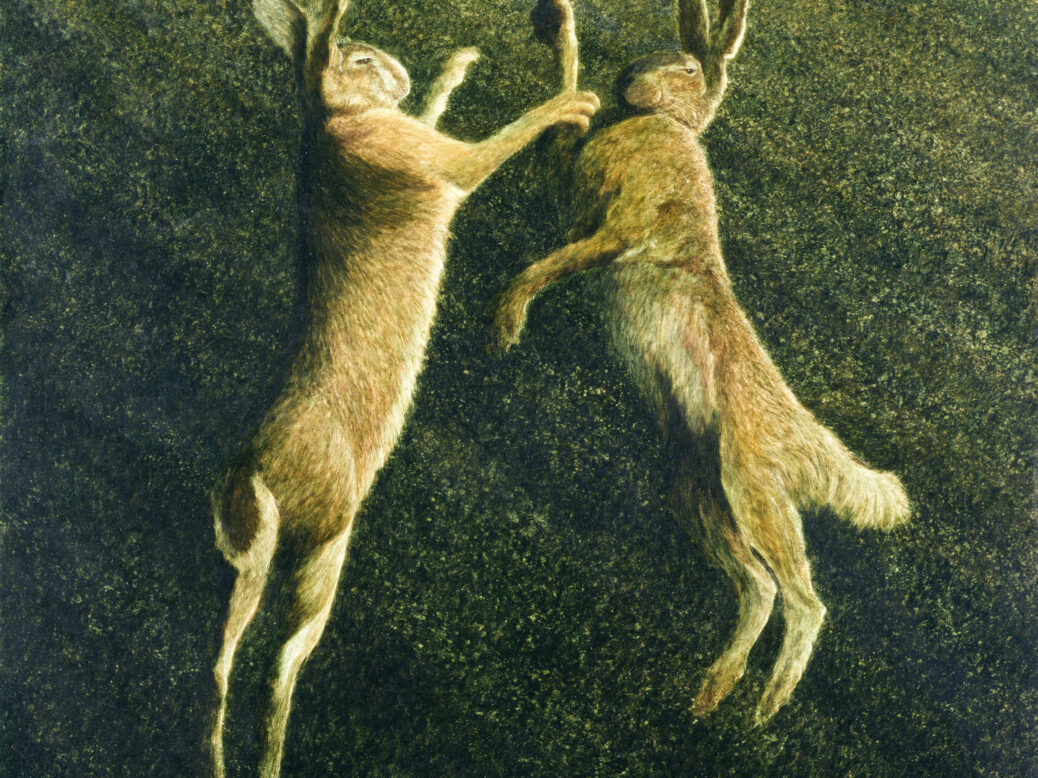
I had left the snow behind for a work trip to California, for hot blue air and palm trees and bougainvillea and a mockingbird that serenaded my first sleepless night with an exquisite repertoire of stolen phrases. Numbing cold at home and searing heat in Santa Barbara brought a confusion that was more than jetlag; I’d lost any sense of the season I was in. As I drove back from Heathrow a week later the snow had vanished but my seasonal disorientation felt worse than ever. Yet as I passed a field of winter wheat beside the A505, somewhere between Royston and Newmarket, I glimpsed something that made everything seem right and slammed me back into what I knew must be spring. Brown hares, five of them, circling, running, hopping, turning to stand on their hind legs to box at each other, kicking mud around under wide and wet silver skies.
I first saw boxing hares on a misty field near Andover when I was a teenager, convinced that I was witnessing buck hares competing with each other for does. So perfectly did this reading of their behaviour correspond with our societal mores, it had the force of truth. The hares circling the fights, I thought, were does, carefully assessing the pugilists’ prowess, and I assumed the victor would take all. I was wrong. Most boxing hares are does unwilling to mate with bucks making sexual advances on them. They rise up and fight them off, an animal analogue to a form of violence just as much a feature of our society, though only in recent years have we begun openly to speak of it.
Talk to people of hares and you’ll hear the world “magical” again and again. Books about hares are rich with lore and legend. Of the hare Boudicca kept under her cloak to release before a battle, the direction of its flight a prediction of the outcome. Of shapeshifting hares. Of hares with an affinity to the moon. Hares as a sign of Easter, of resurrection, of renewal, of spring.
Most of us think of hares as mysterious because myth tells us they are so. But these old stories were based on the behaviour of real hares. They might not be able to change sex at will, as early modern writers assumed, but female hares can become pregnant again before they give birth to their young – leverets that enter the world fully furred with open eyes and rapid independence. Hares eat their own droppings, can run at 40mph – they’re our fastest land animal – and they feed mainly at dusk and dawn, dim presences in the gloom. Solitary animals, they’ll gather in numbers to feed when pickings are rich. Two years ago I was standing in a Norfolk field of beet at sundown when down the tractor lines loped a crowd of hares, astonishingly slow and eerie, their ears glowing red in the dying sunlight and their fur black with shadow.
Humans brought hares from the continent and released them into our landscape around the time of the Romans, or perhaps earlier, but they quickly became natives with a talent for invisibility. Hares don’t burrow. They live always under the sky, making a series of depressions called forms across their territories. These are body-shaped spaces into which they’ll crouch, close to the ground, turning themselves into a low curve of russet you are sure must be a rock sunk in winter cereal before you notice two black-tipped ears laid to its back. A form is the space a hare makes to see everything and be invisible. Tread too close to one and the hare will spring up at your feet, tearing herbage with its hind claws, white tail flashing and your heart thumping in surprise as it races into the distance. Hares are things of eyes and speed and fear, creatures with an astonishing capacity to outrun, jump and dodge things that pursue them – foxes, dogs, eagles.
Predators aren’t the reason hares are declining in Britain; it’s agricultural intensification that has hit them hard. Leverets crouching in silage fields are mown down by harvesters, and modern monocultures leave adults short of food. I don’t see hares often, these days. I encounter them mostly in photos and paintings, or as boxing hare figurines in shop windows: long-eared forms wrought into shapes of graceful confrontation. But you don’t need to have seen live hares to know what they are supposed to mean. They’re magical harbingers of spring.
Spring has of late become thin to me. More and more it means supermarket daffodil bunches and Easter promotions, not the richly textured changes of the natural world: algae greening on the trunks of oaks, the echoing drum of woodpeckers, the return of that indefinable light that hollows out winter. All these are things I’ve missed after a few years working mostly indoors.
Just as the meanings we have given hares can never be as rich and complex as the reality of the animal, so our firm ideas about spring are obscuring what is happening to it. Climate change has made our seasons blur; now catkins appear in winter, cuckoos are rarely heard, and rather than a slow creep, spring is increasingly a short flash of sudden warmth before summer, hardly a season at all. Those boxing hares by the A505 were a glorious sight, but a poignant one. They reminded me of how the meanings we invest in the natural world persist so strongly that it’s hard to see, sometimes, the precipitous alteration in things we’ve long assumed eternal.
Helen Macdonald is the author of “H is for Hawk” (Vintage)
This article appears in the 21 Mar 2018 issue of the New Statesman, Easter special




